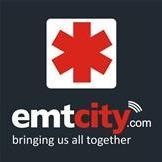June 05--CHEYENNE -- When Catheryne Gerber graduated from emergency medical technician training on May 13, her biggest worry was finding work.
But just three days after finishing her coursework at American Medical Response, work came to her.
Gerber's training and quick thinking helped save the life of a 46-year-old Cheyenne man, Alan Morrison. He had suffered a heart attack while playing softball at the Converse Avenue complex.
Morrison, who works for APW Wyatt, a local kitchen equipment manufacturer, said he went for a foul ball.
"We were in the fourth inning, and I remember running over there thinking, I was finally going to finish a game," he said.
Morrison had been unable to complete two earlier games due to injuries.
"I remember throwing the ball back to the pitcher," he said. "The next thing I remember was waking up in the hospital."
Brenda Hammock, a clinical education specialist at American Medical Response, said Morrison went into ventricular fibrillation. That is when the lower chambers of the heart twitch randomly instead of properly pumping blood.
"V-fib" is a leading cause of cardiac arrest, and people can die within minutes without immediate attention.
"One of his major arteries was completely blocked," Hammock said. "He had no pulse and (gasping, labored breathing), which is a very common thing: Your brain is trying to get oxygen."
By coincidence, Gerber was also at the complex that evening, rooting for another team. She heard a woman calling for help.
"There was a lady running around asking for a doctor or nurse, EMT," Gerber said. "I thought to myself, 'Oh crap!'"
Gerber said no one seemed to be offering to help, so she followed the woman. Upon seeing Morrison, she recognized the signs of a major heart attack and began giving directions to a bystander on the phone with 911.
"He was lying there, not breathing. He had no pulse, so I immediately opened up his airway," Gerber said. "A friend of his started doing CPR, and I guided him at first because he was going really fast. Then I did a set and then we switched again."
It took only four minutes for paramedics and fire crews to arrive and help stabilize Morrison. But AMR paramedic Beau Murphy said Gerber's actions were nonetheless crucial to Morrison's survival.
"What the compressions were doing was circulating enough oxygen and blood to maintain that V-fib (and prevent a complete cardiac arrest)," Murphy said.
Within 10 minutes, the paramedics had Morrison stabilized, and they took him to Cheyenne Regional Medical Center. There, the cardiac catheter lab was able to clear the blockage in his artery and install stents in his heart.
But it wasn't until interviewing alongside the paramedics this Tuesday that Morrison learned just how lucky he was.
While AMR paramedics are able to save about 29 percent of heart attack cases n about 10 percent higher than the national average n the patients who survive almost always have added complications due to oxygen deprivation.
Cody Schilling, who taught Gerber's EMT courses, said that for a patient to be walking around just days after a heart attack is the exception rather than the rule.
"To make a full recovery out of that is very rare," he said. "This is probably the fourth one this year for us out of a couple hundred calls."
Gerber said she felt a rush of adrenaline at the time she helped save Morrison's life, but she added she doesn't feel like a hero.
"I just started it; (the paramedics) are the ones who did it," she said.
But Murphy insists that had Gerber not acted when she did, Morrison's life would be different today -n if he had survived at all.
"It made the difference between him sitting here now and possibly being in a coma," Murphy said. "It took me five years in EMS before I had a cardiac arrest save, and I couldn't count how many cardiac arrest calls I'd had."
Hammock said Morrison's survival also shows the importance of learning compression-only CPR, a technique that takes just minutes to acquire and does not take certification.
"We'll do it for free," she said. "You can walk in and I can teach it to you in 10 minutes."
Gerber said she plans to continue her hunt for an EMT job in the region, now with the best resume booster she could ask for.
But Hammock said she is hoping Gerber won't have to look far.
"Trust us, we have our eye on (her) and we're certainly going to let her know about our next hiring academy," Hammock said.
As for Morrison, he has committed to quit smoking and change his eating habits. He said he still doesn't remember much of anything from his heart attack, but he's grateful for the new lease on life.
"It's like a dream, like it really didn't happen. But every time I look in the mirror, it's like, it did happen," Morrison said. "It's a miracle. It really is."
And today, just two and a half weeks after his brush with death, Morrison is returning to work.
___
©2013 Wyoming Tribune-Eagle (Cheyenne, Wyo.)
Visit Wyoming Tribune-Eagle (Cheyenne, Wyo.) at www.wyomingnews.com
Distributed by MCT Information Services
A service of YellowBrix, Inc.


Recommended Comments
There are no comments to display.
Join the conversation
You can post now and register later. If you have an account, sign in now to post with your account.
Note: Your post will require moderator approval before it will be visible.